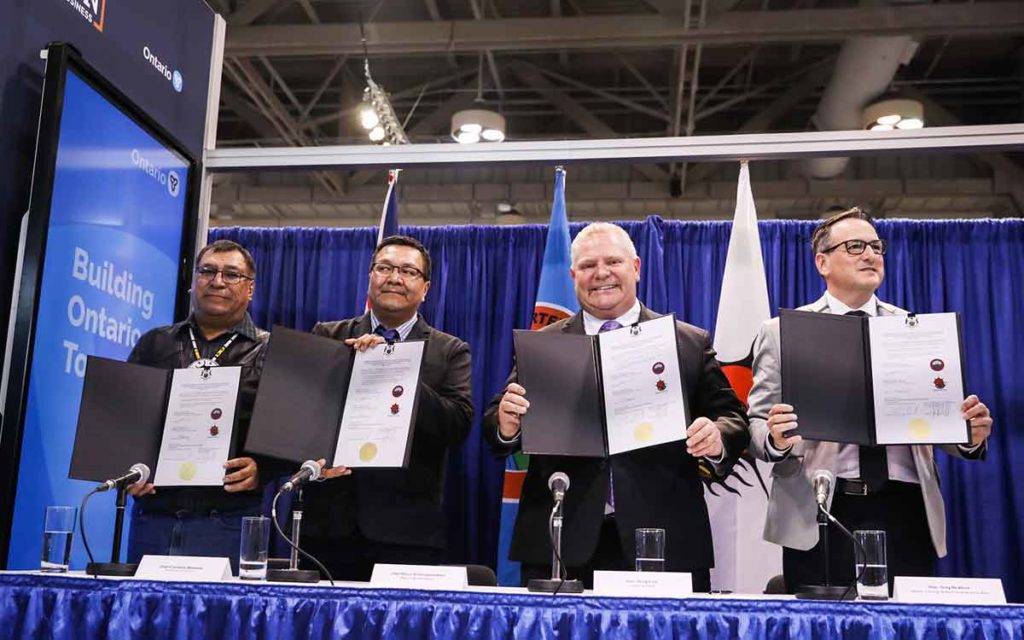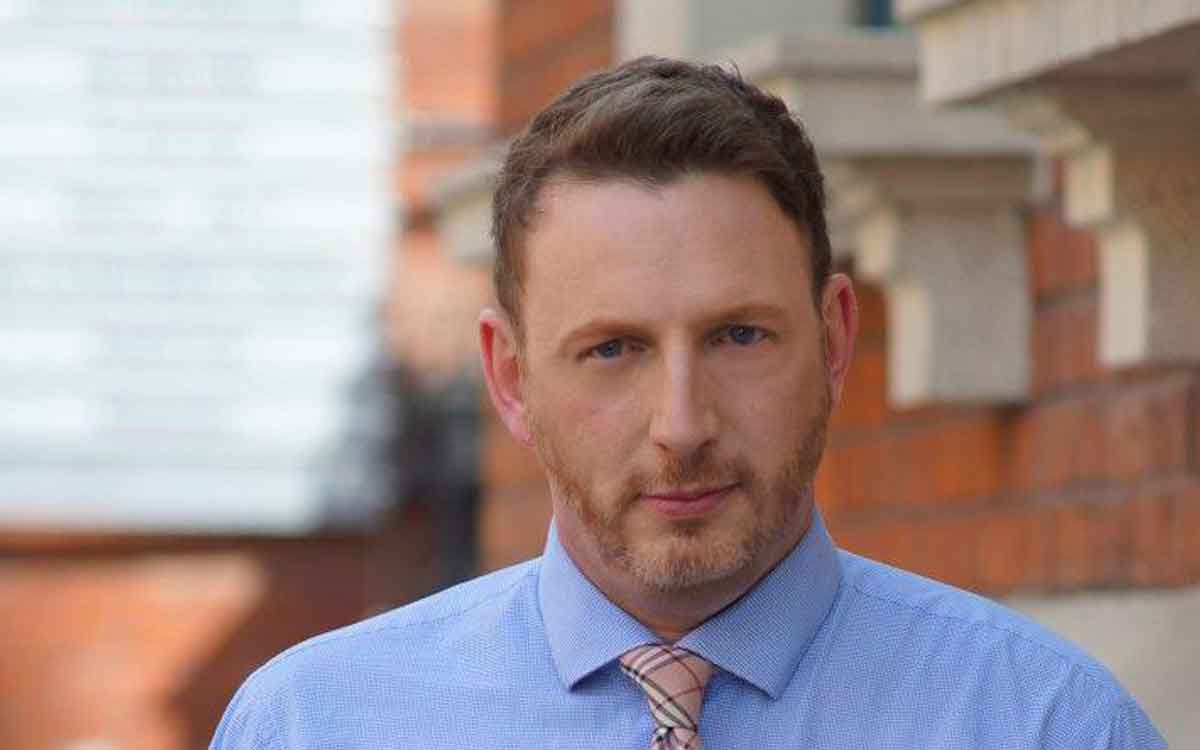
Premier Doug Ford and Greg Rickford, Minister of Energy, Northern Development and Mines and Minister of Indigenous Affairs, were joined by Chief Bruce Achneepineskum of Marten Falls First Nation and Chief Cornelius Wabasse of Webequie First Nation at the Prospectors and Developers Association of Canada (PDAC) convention today for a signing ceremony. Supplied photo.
During the 2018 Ontario Election campaign PC Leader Doug Ford said he would open up the mineral and economic riches of the so-called “Ring of Fire” even if he had to bulldoze the road himself.
The “Ring of Fire” is roughly 500 kilometres northeast of Thunder Bay and is said to possess multi-generational economic potential. Key finds in the area are chromite, nickel, copper and platinum.
Given the present climate in Canada relating to relations with First Nations the now Premier must have considered visiting the nearest Cat dealership and then taking heavy machinery driving lessons.
Then earlier this week during the Prospectors and Develops Annual Convention, held in Toronto, he unveiled a better kind of earthmover – a negotiated agreement with traditional First Nations people.
Meanwhile on the other side of the country the BC NDP John Horgan government along with its Federal counterpart was also cutting a deal. This deal was to do something with the disputed land the proposed liquefied natural gas pipeline is to run across in Northern B.C.
The cost and specifics of that deal, well no one knows, and if you were hoping to speak to the elected chiefs and council in the area don’t bother, they were not invited to the negotiations.
Getting back to Ontario, the signing ceremony for the creation of the Northern Road Link to the “ring of fire” included Premier Ford, Greg Rickford, the Ontario Minister for Northern Development and Mines and Minister for Indigenous Affairs. The ceremony most importantly included Chief Bruce Achneepineskum of Marten Falls First Nation and Chief Cornelius Wabasse of Webequie First Nation.
According to the government’s press release – which took a-none-too subtle swipe at the previous Liberal McWynne governments – lays out the economic and First Nations benefits.
The first part of the agreement is support for the various First Nations to conduct environmental assessments for “their all-season road projects” and to start the development of the Northern Road Link.
Next Ontario commits to fulfilling its duty to consult the First Nations for road infrastructure projects. Additionally, the First Nations will be relied upon as environmental stewards with traditional knowledge of the area – according to the government’s release.
The announcement also talked about the government’s October unveiling of a $30 million broadband project for five Matawa First Nations member communities. The Nibinamik, Neskantaga, Eabemetoong, Marten Falls and Webequie communities for those keeping track at home.
Broadband and the ability to be connected are essential in 2020. In fact it was former Liberal Prime Minister Jean Chretien in 2002 who announced the federal government would speed up funding for then “controversial” high-speed Internet access throughout Canada. Considering he had a surplus how controversial could it be?
The area in question is remote, access to high-speed and broadband Internet means access to health care, communications, education and even potential job markets.
So let us compare and contrast the two big First Nations announcements this week. You have the Ontario government essentially going it alone with First Nations partners.
The announcement was made at the huge PDAC mining conference and materials outlining the deal were made readily available. The deal was signed in public with the Chiefs of effected First Nations at the table.
The deal includes the province’s duty to consultation and all parties’ responsibility to protect the environment. The government’s communications materials even go so far as to point out the government is relying on the First Nations – the traditional stewards of the land – for their expertise of the land base.
The agreement then goes beyond simply building a road to a mining site and upholding the law, the agreement also adds access in another way – to the Internet. This infrastructure investment is key to helping the First Nations access the new economy as well as government and social resources.
So lets go back out west for a moment. Carolyn Bennett, the federal Indigenous Relations Minister from downtown Toronto and her BC NDP counter-part Scott Fraser were finally granted a meeting with the Wet’suwet’en hereditary chiefs at the centre of ongoing pipeline dispute.
Supposedly they cut a deal, again to do what exactly, we don’t know. Will this deal be widely approved and put an end to blockades and protests across Canada? We don’t know that either.
What will the cost of the deal Ms. Bennett and Mr. Fraser cut? Yup, you guessed it, haven’t got a clue.
When will that information come to light? Supposedly only after the Wet’suwet’en hereditary chiefs get to vote on it.
So a deal cut in private, at a cost that is unknown, with likely results completely unclear. What could go wrong?
Well, how about if you decide not to include the legally elected chiefs to the negotiations.
Maureen Luggi, an elected chief of one of the six Wet’suwet’en nations, was not included in negotiations over rights and title with the senior levels of government.
She told CKNW radio in Vancouver on Wednesday; “We did express in a letter to the Office of Wet’suewe’ten (the hereditary chiefs) that all of the six Wet’suwet’en communities were excluded from the process, we don’t know who was invited to participate. We later learned that other Wet’suwe’ten communities were included.”
That’s right, basically Canada has been brought to a grinding halt because one group of First Nations leaders didn’t feel they were heard in negotiations and were unhappy with the results. The governments of B.C. and Canada decide to fix the problem, they will negotiate with the originally shunned group meanwhile shunning another group – the legally elected group.
So the next step for the B.C. and Canadian governments is to build consensus with people they couldn’t even be bothered with negotiating with.
In Ontario we have seen Premier Ford and Minister Rickford, along with Chiefs Achneepineskum and Wabasse show how governments – first nation and provincial – can work together.
In B.C., everyone must be holding his or her breath. If this if frustrating to you – imagine how First Nations and industry in Canada’s most westerly province feels.

Kelly Harris is Principal of Harris Public Affairs. He is a regular commentator on Global News Radio 640. He has spent the last decade working with Canada’s credit unions and served as Director on the Board of the Canadian Credit Union Association. An internationally published journalist, he has held senior positions in the Gordon Campbell government in British Columbia and Tim Hudak’s opposition at Queen’s Park. An avid traveller, cyclist, member of Bills Mafia and die-hard fan of the Toronto Maple Leafs.




















